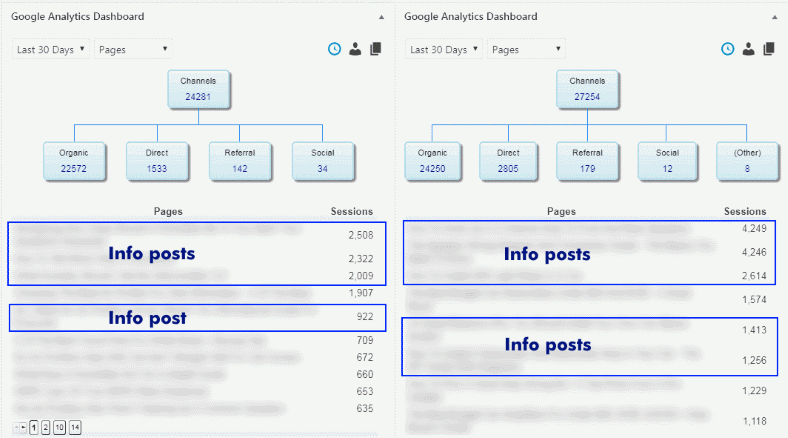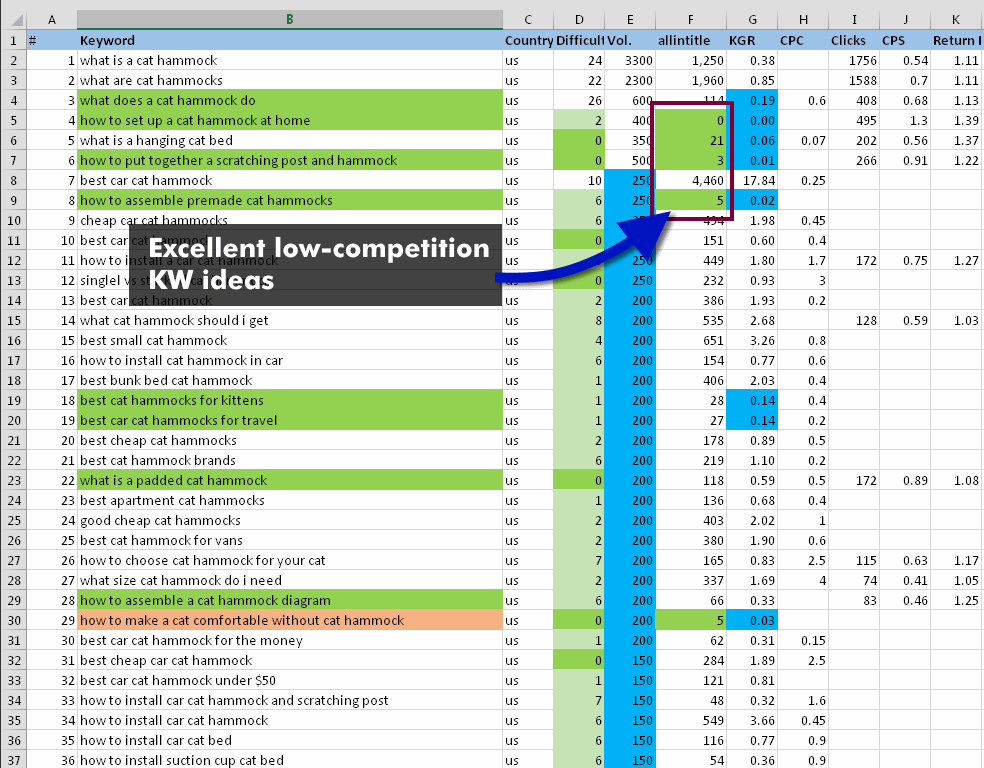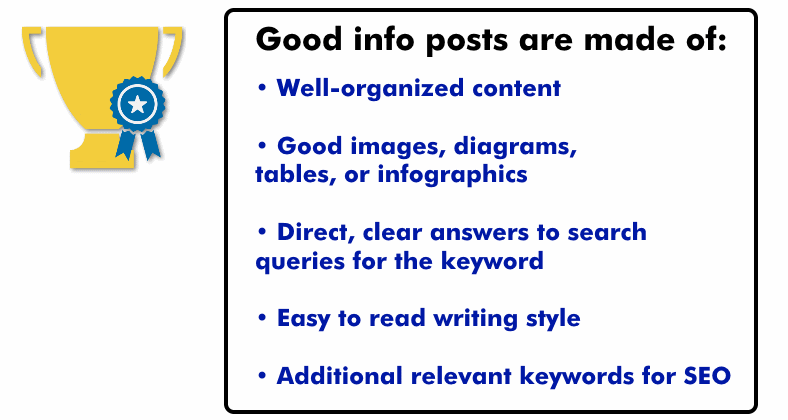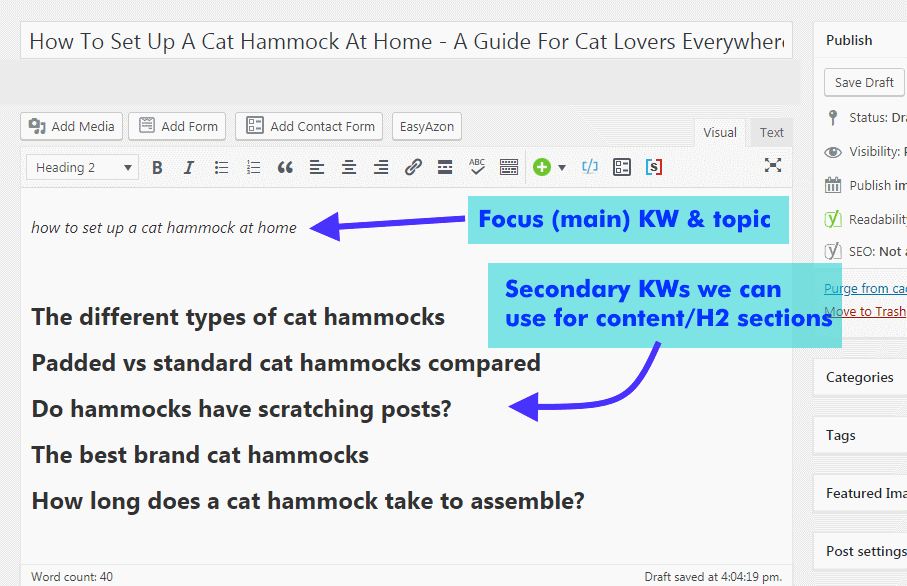This is a post by my friend, Marty, who is also a student of Five Figure Niche Site. He’s crushing it with his own sites so I asked him to write some for NSP. While Marty is a student, I know he’d be doing well either way.
Informational (i.e. “how to”) posts should make up about half of your content, even if you have an Amazon affiliate income site monetized by product reviews. You need the info content so Google and Amazon won’t see your site as too sales-y with thin affiliate content.
Plus you can get a lot of traffic to your site… Let’s send it to Marty to break it down.
One thing I see over and over again among affiliate sites is a lack of good, well-written info articles. Far too many sites (especially Amazon affiliates) focus a lot on buyer keyword posts.
That’s a shame, and if you’re doing so you’re costing yourself traffic and even site authority.
In this post, I’ll explain why you should target even “dumb” low-competition keywords with good informational articles that satisfy the reader’s search needs.
Targeting these was one of the best decisions I’ve ever made and I’ll show you why. The results speak for themselves!
Info post traffic examples

Examples of how much traffic my info posts on both sites are getting per month. The results speak for themselves!
Well-written info posts with great images and clear, helpful information for keywords that may seem “dumb” or unappealing are often a goldmine of opportunity.
These are all based on low-competition keyword opportunities I found & evaluated.
When I was a beginner to affiliate marketing (having received training from Multi Profit Site formally Five Figure Niche Site) I learned how to do keyword research.
The main approach we learn is using the keyword golden ratio (KGR) to further narrow down and target low-competition keywords.
In doing so I found some informational post (“info”) keywords that might seem unappealing or even “dumb” but were excellent opportunities.
While these types of keywords might not fit the KGR criteria (as I found several with monthly estimated search volumes of over 250/month) they can still be great opportunities.
For example, some of the best info keywords I’ve found are simple in nature:
- What is a xxxx?
- How to use xxx, how does a xxx work, and similar search queries
- What setting/level/speed should I set my xxxx product to?
…and so on. Quite a few had search volumes of 300+/month or even more!
While many site owners ignore keywords like these, there’s clearly a demand for them to be answered.
If you do good keyword research you can find great info post keyword topics with very few – if any – competing sites ranking for them.
Finding good info post keywords (example and thoughts)

Let’s look at a fictitious keyword example. (Note: The keyword shown may be purely for example purposes, but I’m using my own real keyword data to help illustrate.)
Let’s say our seed product/idea keyword is “cat hammocks.” We’ll follow the same KGR keyword research process as we always do:
- Generate a list of keywords based around that. Ideally filtered for lower difficulty and eliminating unwanted terms like e-commerce results, “free”, used, etc related, and others.
- We keep info results in the list
- KGR evaluation: We find allintitle Google search values for each keyword and calculate the KGR value
- Manual checking: With our resulting keyword list, we check to see if there are any info post gems we can use
Most importantly it’s critical to not be too quick to disregard info posts keywords that may seem boring, too basic, or don’t sound “flashy.” Remember that these have value. Stay open-minded during your evaluation process.
Looking for good low competition info KWs

What we’re looking for are low allintitle values and weak or little existing posts. If we find relatively low allintitle values for a keyword we can then check manually in Google results:
- What results are shown for that info KW?
- Of the results shown, how good is the content?
Often I find that the ranking posts for a search query are of poor quality or are only a subtopic in an existing related product post. In some cases, they’re not even “real” posts, but a post on a junk keyword site.
These conditions are an excellent sign that we have a very good chance of ranking well & receiving high search traffic if we create a high-quality post.
In fact, when I began this approach for adding info posts I debated whether or not I should use these search phrases that seemed too “dumb” or “too basic” to me.
However, choosing to write about them was one of the single best things I’ve ever done!
An example + next steps
From the example keyword list above we can see that the keyword phrase “how to set up a cat hammock at home” looks to be a potentially excellent choice. If it’s receiving little attention in search results from other sites that’s a green light for us to move forward.
Once we’ve found a good opportunity it’s time to create our content.
What makes a good info post?

One thing I’ve learned when it comes to content is that quality counts.
Well-done posts with the reader in mind that deliver real value and are easy to read can do very well.
Some important factors to think about when writing info posts are the following things that contribute a lot:
- Well-organized content (consider a table of contents and the content should “flow” in a way that makes sense).
- Good images, infographics, tables and other visual elements are very helpful to readers.
- Be clear and directly answer the search query. A good informational post will help a reader find an answer to their question one way or another.
- Easy to read: Remember that you’re writing for a general audience, not academic audiences. Use a conversational tone that’s easy to read. Break long sections of text into smaller sections
- Optimized for SEO: Where possible, add additional secondary keywords as applicable which you can use as H2 subsections within the content
Time after time, following this approach well has helped me dominate low-competition keyword opportunities. In fact, my success rate currently is around 80% ranking in the top 3 positions with the others almost always on the 1st page in Google results.
The main principle here to take away is don’t cheap out on info posts. Write solid, helpful post following the guidelines above.
Over time, as traffic increases more and more, your site will benefit more and more. Additionally, clear, well-written info posts give an impression of authority and high trust level to your readers.
Besides, it’s also just a great feeling to get positive feedback from readers that you’ve helped them!
Don’t forget to optimize for SEO!

Optimizing an info post for better SEO and better content quality has several parts that fit together.
By adding “secondary” keywords to your info post, you can not only add additional keywords (KWs) to rank for but enhance your content quality as well!
What do we mean by “SEO optimizing” an info post? Search engine optimization (SEO) in this case means adding additional (secondary) keywords that we can rank for.
Additionally, we can make great use of keywords we would otherwise ignore in our keyword research results list. But wait, it gets even better!
By picking good secondary keywords we can add relevant, helpful subtopics in content that are both signs of authoritative content and deliver real value to the reader.
Wait – how exactly do we optimize an info post?

Shown: Optimizing our example info post to improve your keyword search results and to get better content. I typically use the secondary keywords I’ve selected that make sense, add value to the reader, and are highly relevant to the topic for H2 subtopics. They may need a bit of tweaking for correct syntax and proper English, but normally very little changes are needed.
Let’s continue with our above example info keyword “how to set up a cat hammock at home.” We’ll then make note of additional secondary keywords (keywords aside from the H1 title/search intent keyword) that we can use.
These can be keywords of very low search volume.
In fact, I often use low-volume keywords, as many aren’t be covered well by competing sites. I focus on finding good keywords I can use to write content sections for.
Following this approach, I might find some great secondary keywords such as:
- different types of cat hammocks
- padded vs standard cat hammocks
- do hammocks have scratching posts
- best brand cat hammocks
- how long does a cat hammock take to assemble
As you can see, keywords like this are (1) very relevant to the main topic, and (2) help answer questions many readers have related to the topic.
I then use keywords like these in H2 sections within the content in addition to answering the main search query (focus info post keyword). Note that my posts are very successful because I make sure to answer the main search query very clearly and make the answers easy to find & read.
The additional keywords subtopics are just “icing on the cake” both for the reader and for SEO ranking.
Final thoughts
I’ve fairly consistently ranked at the #1 position for my info posts using this method and got a big boost in my site traffic and authority. Certainly, you can, too!
Remember these key points when it comes to choosing a great low-competition info keyword & writing great informational content:
- Look for low-competition info keywords that are being poorly covered or ignored in search results. These may not be KGR compliant but may have higher monthly search volumes.
- Use great images, diagrams, infographics, and more. People love diagrams and other images that are clear and get the point across clearly (and are easy to read on small screens, too!)
- Be sure to answer the main focus info KW clearly and directly.
- Optimize for better SEO (and content) by taking advantage of additional keywords you might not otherwise use.
By following these tips you too can potentially help your site drive more traffic and even suggest some related products within the info posts.




Comments on this entry are closed.
Doug, awesome article! I’ll build a new post by following in detail the tips given here.
…”In fact, when I began this approach for adding info posts I debated whether or not I should use these search phrases that seemed too “dumb” or “too basic” to me”…
Did you write this line for me Marty? ?
This is exactly what was happening to me lately. When I was looking through my keyword pool I was just skiping those silly queries that didn’t had any commercial value or simply looked way too silly to me in order be covered.
That’s my lesson learned today.
Cheers Marty. And thanks Doug for having Marty on your blog to share these marketing gems with us.
Hey my friend & thanks for the comment. Yes it’s really easy to overlook these as I feel like we’re sort of “programmed” to think in terms of buyer keywords too often.
I very clearly remember debating trying for these types of info posts. Wow, I’m so glad I did! It really paid off and still is (traffic for those grew higher and higher over time).
Plus it’s nice to get comments from readers that the information helped them, too. 🙂
Thanks to Doug for the opportunity for me to contribute.
Good post, many thnaks,
I’m new to this. There is a graphic mid-post with a KGW and allintitle columns. What tool is this,
many thanks > Steve
Hi Steve you mean the spreadsheet and you mean “KGR” not “KGW” I think?
The spreadsheet is just what I’ve exported from my keyword research tool. I then add the allintitle column & KGR column. That’s from Doug’s Five Figure Niche Site training course material.
He covers that in his YouTube channel and you can get some good info there.
I don’t normally comment on blogs, but this one was very helpful and Well put together. After reading this I’m ready to adf an extra punch to my blog strategy. I’ve been staying away from how to blog post because I thought they were not buyer keywords and didn’t want to waste my time. After reading this post I’ve change my mind because there is a lot of opportunity that I could be missing out on.
Thanks again,
Justin
Awesome, Justin! Marty crushed it again.
This is a really interesting post, thanks. But here is something that I am confused about. At the start of your article you state that about half of your posts should be informational, but how does this work? Do you mean, that if your site has 100 posts on it then 50 should be commercial and 50 informational? Or do you think that Google/ Amazon looks at it in different way, such as if your site has 150, 000 words on it then they would like 75, 000 words to be information content and 75, 000 words to be commercial/ review content? Most of my posts are commercial but these posts tend to contain a buyer’s guide/ FAQs and product reviews. I am asking for clarification because I am disappointed by my traffic…
And the buyer’s guide and FAQs word count exceeds the word count of the product reviews
Hi James. In the beginning of the article the “half” comment was from Doug’s addition to the article here. Perhaps he will chime in with more about that.
What I can tell you is that just like Doug and others would say, you don’t want 100% affiliate posts in your site. You need informational posts as well. It’s not entirely for SEO/Google purposes, either. There’s also the matter of the user experience, content that drives traffic & answers search queries, and so forth.
I also have a “buyer’s guide” section in all my buyer keyword posts. I no longer worry about the ratio of buyer to info posts as long as I make sure there are some good info posts. I put 100% effort into those I’ve written and it has really paid off.
Most of the time what I see on other affiliate sites are very poor quality “info” posts that certainly don’t put the reader’s interests first, and also aren’t optimized for SEO.
If your traffic is poor it comes back to:
– How are your 1st page rankings?
– If your rankings are poor, you’ll need to target keywords you have a good chance to rank for (hence Doug’s course) and write very good posts for those.
Informational posts like I showed examples of in this article are an EXCELLENT way to get high traffic numbers, but you have to put in real effort to get the results I do.
One of my info posts has now grown to almost 9,000 visits/month at this point.
Yes info posts rank really well and much faster than buyer keyword posts.
I also get almost 80% of my site traffic from info content. And almost 75% of those info posts rank in top 10.
They get good traffic and they are great if you have ads on your site.
Thanks Marty for this article.
Great stuff, Marty!
I always tell people also to have a plan for informational content. Either monetize with ads, push people to relevant affiliate products, try to get them on your email list, or something else.
Traffic is awesome, but you’ll need to have a strategy to get some kind of value out of it.
Well said!
I’m intrigued….you talk about some of the keywords being so simple that they are dumb, but what is the word count in the shortest article that is ranking well?
Hi there. Well at this point I don’t stress about word count anymore.
What I’ve found is that when I really go all-in and focus on writing great posts, the length will come naturally. I’ve also heard this said before by someone else.
Depending on the level of detail that I think is needed for a post, my info posts easily average 3K-4.4K words in length. Also I use good images and many have an infographic I make.
I strongly recommend a table of contents, too, like using the Table of Contents Plus plugin.
Great post if we could see the images in it. For some reason the images do not display in my browser (both for Chrome and Edge browsers). I keep getting a rotating icon with no image shown.
Great stuff Marty…I have definitely seen this in my own sites.
One pitfall I fell into with informational posts (that I eventually learned my lesson on) was not ignoring the really really basic stuff. My sites are all on topics that I am knowledgeable on, so I’ll find a great KGR keyword and think “everyone knows that already” or “that’s way too basic.”
Well it turns out that the very basic stuff is often the most popular. People are searching because they are not experts.
I just started a new project in the Heath niche and I didn’t even take most of low competitive informational keywords into consideration (despite non presence of good contents for it).
Thanks for opening my eyes Marty and more thanks to Doug!
Good Post. One of the best on KGR. I have two questions.
1)What is your best estimate of the range you would select for the KGR (>0.25 to ?.??) if the KW has low competition and high MSV. How high would you go?
2)Could you define how you select your relevant secondary KWs? I have a problem understanding how it is done. Those that you selected was not on your spreadsheet.
Thanks,
Hi Don.
1. Well I set mine to 0.28, but that’s just a “ballpark” because I know from experience the Allintitle value can vary based on your location. For example, my work PC gets slightly different allintitle results than my home PC. (Note: At the office they’re using a different ISP, which can have a different geographic IP address etc.)
I would worry less about a specific KGR value, and just if it’s pretty close to the KGR ratio. You can highlight ranges of numbers with color fills in Excel to do this and scan your keyword spreadsheet quickly, then evaluate those that standout further. Hmm maybe try 0.28 like I am and see how it works for you.
If you’re an absolute beginner, however, I would say stick with 0.26 like Doug advises. It takes experience to be able to broaden your keyword research skills.
But always remember to check them on an individual basis for finding the best ones.
2. Well, to clarify, I ignore the KGR ratio for secondary ones. However, if there are some secondary ones with zero/extremely low allintitle values, those are great choices as it means they’re not getting covered.
Mainly I look for secondary keywords based on these criteria:
– Is it highly related to the topic?
– Does it add value to the reader? Will it be informative to them somehow?
– If the search keyword phrase has bad grammar, can I fix it up and still use it easily?
– Does it makes sense as a subtopic in an H2 section?
Really that’s all it comes down too. Think about the last time you were reading a high-quality article and the various sections you read as you went.
There were several sections I’m sure which weren’t EXACTLY about the main keyword/topic, but were related, and added something useful. That’s what I mean.
It gets easier with practice. Just get started doing it – that’s the most important thing. 🙂
Do you add affiliate link into type of post, Marty?
Hello Huy, yes I do where it makes sense, but info posts have a very, very low click-through rate for affiliate links. That’s due to the reader’s search intent before for information, not products I believe.
I’m now starting to run ads in my info posts which can generate good money.
This is a great post, I’m learning so much! I’ll try all those tips. Thanks!
Noooo, don’t share the secret 😀
Just kidding, well written, and 100% accurate.
I’ve been doing affiliate marketing for over 13 years and this is one of my main tools.
Good post Marty
Wow, what a great idea! I never even consider low competitive informational keywords into consideration.
Cheers!